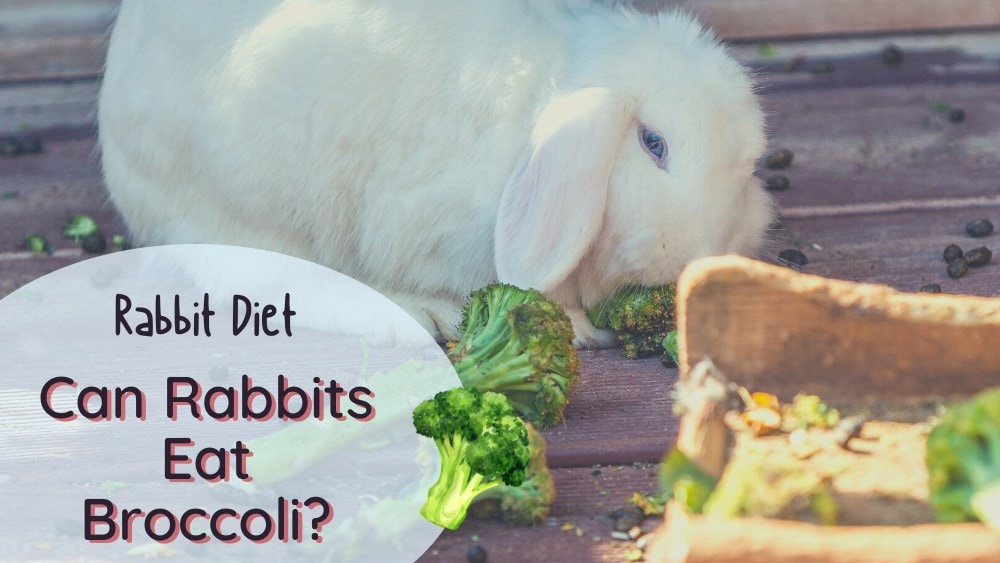Broccoli. Maybe you loved it as a kid. Or maybe you shoved it aside, muttering, “rabbit food.”
But wait. Now that you’re a real bunny owner, you’re wondering if those bright green florets are actually safe for your rabbit to eat. Can rabbits have broccoli?
Well, we wish there was a simple answer. But, like many foods, broccoli is only safe for rabbits if it’s fed correctly. Today, you’ll get answers to these questions:
- What parts of broccoli can rabbits safely eat?
- How much broccoli can rabbits eat?
- Will broccoli give rabbits bloat or gas?
- How do you prepare broccoli for rabbits?
- Are other brassicas like kale and cauliflower safe for bunnies as well?
Can Rabbits Eat Broccoli Safely?
Broccoli is not toxic to rabbits if they eat it as part of a balanced diet. Rabbits can eat all parts of a broccoli plant, including broccoli sprouts, but the leaves are the most nutrient-rich and easiest for them to digest. If rabbits have excessive cruciferous veggies like broccoli it can cause digestive upset.
6 Benefits of Broccoli for Rabbits
Broccoli is real food. It’s so much better for bunnies than fillers like soybean hulls and wheat middlings that make up the bulk of commercial rabbit pellets. Here are some benefits of broccoli for bunnies:
- Natural vitamins and minerals. Broccoli is a great source of potassium (a mineral that can be hard to get enough of!), as well as vitamin C, vitamin K1, and folate. Commercially pelleted feeds contain all the vitamins and minerals that rabbits need to survive added to them in synthetic forms, but many argue that the ones found naturally in whole plants like broccoli are easier for the body to use.
- High fiber. Broccoli – the stem in particular – is high in fiber. A rabbit’s diet needs to be at least 20% fiber – so rabbits need way more fiber for their weight than humans do! Broccoli is a great way to get fiber into your bunny while giving it something more interesting to snack on than hay.
- Dental benefits. Since broccoli is tough and fibrous, many humans don’t like to eat it raw. But bunnies love it! In fact, rabbits need a steady diet of coarse plant material to wear down their ever-growing teeth.
- General wellness. The group of vegetables called “brassicas” or “cruciferous” veggies includes broccoli, cauliflower, cabbage, brussels sprouts, and others in the same family. Cruciferous veggies are known for their sulfur-containing compounds called glucosinolates. While glucosinolates can lead to gassiness, they have benefits as well.
This 2021 study describes glucosinolates’ role in preventing major diseases including cancer, diabetes, and neurological conditions. The study was done on humans, but we can guess that these vegetables have similar benefits for rabbits and other mammals. (I mean, it’s gotta be better than soybean hulls, right?)
- Sulforaphane. Let’s get even more nerdy! There’s a specific glucosinolate called glucoraphanin that is released when cruciferous veggies are chewed up. (Among cruciferous veggies, broccoli is especially high in glucoraphanin.) In the digestive process, glucoraphanin mixes with a digestive enzyme in mammals called myrosinase and creates a compound called sulforaphane.
There have, in fact, been scientific studies showing that sulforaphane is beneficial for rabbits! In this study, it had positive effects on rabbits’ eyesight, and in this study, it helped bunnies with severe lung disease.
- Low oxalates. Lastly, broccoli is low in oxalic acid. Rabbits are prone to kidney stones and bladder infections, and vegetables like beet greens and spinach, which are high in oxalic acid, make these problems worse. (See this list of foods you should NEVER feed to rabbits!)
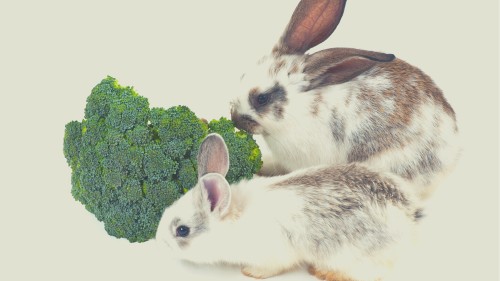
Cautions About Feeding Broccoli to Rabbits
Broccoli is good for rabbits – but you can always have too much of a good thing. If rabbits were fed mostly broccoli, and little else, they would develop thyroid disease. They would also probably struggle with bloat and potentially life-threatening digestive blockages. Let me explain:
There haven’t been any studies done specifically on broccoli and rabbits, but scientists have experimented with feeding rabbits large amounts of a closely-related vegetable, cabbage. So we can look at studies done on cabbage and rabbits to determine if broccoli is likely to be safe in large amounts.
In one famous study, scientists Chesney, Webster, and Clawson discovered that if rabbits were fed primarily cabbage, they developed thyroid goiter.
Cabbage (and broccoli stems) also contain short-chain sugars that don’t get digested in the stomach. Instead, they ferment in the intestines, causing gas. These sugar-based carbohydrates are generally difficult for the digestive system to break down. If fed in excess, they could slow digestion down so much that it would cause GI stasis.
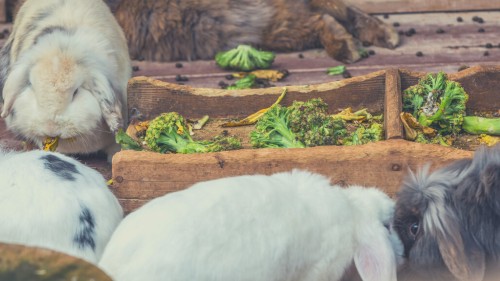
How Much Broccoli Can Rabbits Eat?
Obviously, we don’t want our bunnies suffering from bloat or goiter. So how much broccoli is too much?
As long as broccoli is only a small part of a rabbit’s diet, it won’t cause harm to your bunny. We recommend starting with just a 1/2” cube of any cruciferous vegetable and slowly working up to feeding more if your rabbit tolerates it. Rabbits can eat more broccoli leaves than broccoli stems or florets, since leaves are less likely to cause gas.
Most veterinarians recommend that a rabbit’s diet should be 80% hay, 5% pellets, and 15% green vegetables like broccoli. As long as you feed some non-cruciferous vegetables to your rabbit along with brassicas like cabbage, cauliflower, or broccoli, your bunny will be fine.
The 10th edition of the famous scientific rabbit-keeping manual, Rabbit Production, by Lukefahr, et al, 2022, says it best. The authors state that “Moderate amounts of cabbage or other greens will not cause problems” when fed to rabbits.
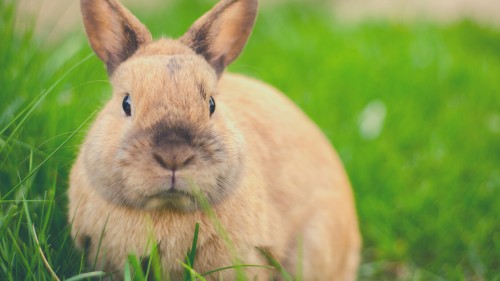
However, if your rabbit stops pooping regularly or shows signs of stomach discomfort, you need to act quickly! Stop feeding any starchy or cruciferous vegetables and give lots of hay instead! Call your veterinarian for advice.
What Parts of Broccoli Can Rabbits Eat?
All parts of a broccoli plant are edible for rabbits. This includes:
- Florets (crowns)
- Blooming flowers
- Stems
- Leaves
- Seeds
- Sprouts
- Microgreens
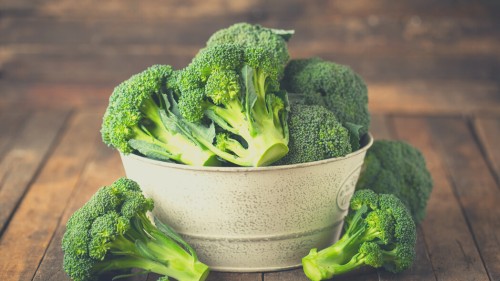
Can Rabbits Eat Broccoli Sprouts?
Broccoli sprouts and microgreens are baby broccoli plants that are only grown 3-14 days past germination. They may be grown in a glass jar or planted in soil. They have higher concentrations of nutrients than adult broccoli plants, but less fiber. Because they are high in glucosinolates but don’t have as much fiber, they could make your rabbit gassy more quickly than other parts of broccoli plants, like leaves.
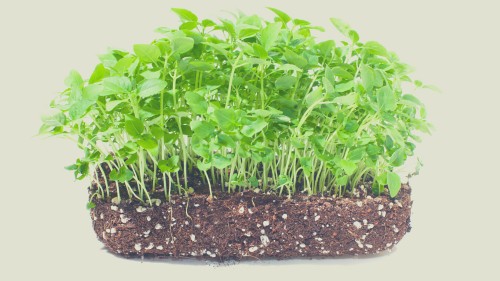
So, while broccoli sprouts or microgreens aren’t toxic to rabbits, bunnies should only eat about a tablespoonful of them a day, and not with other brassicas.
Can Rabbits Eat Broccolini?
Yes, rabbits can eat broccolini (baby broccoli), broccoli rabe, Chinese broccoli (Yod-Fah), or any other kind of cruciferous vegetable. Here’s a list of some of the vegetables in the brassica family:
- Arugula
- Bok choy
- Broccoli
- Broccoli rabe
- Brussels sprouts
- Cabbage
- Cauliflower
- Collard greens
- Kale
- Kohlrabi
- Mustard greens
- Radish greens
- Rapini
- Rutabaga greens
- Turnip greens
- Watercress
Did you know all those veggies were related? Take time to get familiar with this list, so you make sure not to feed too many cruciferous veggies at once.
Make sure to read our article on “Can Rabbits Eat Cabbage?” for more information on feeding brassicas to rabbits.
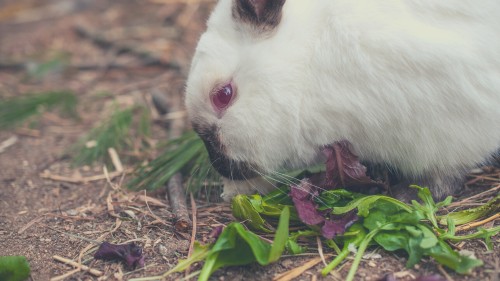
Great vegetables for rabbits that aren’t in the broccoli family include parsley, pea plant leaves, carrot tops, dandelion greens, and green bell pepper.
How to Prepare Broccoli for Rabbits
Since every part of the broccoli plant is edible, it’s easy to prepare for your bunny. Rabbits can eat the leaves or scraps of stems that you don’t use when you cook broccoli for your own meal. But, in my experience, they only enjoy these when they’re freshly cut and juicy, and not when they’re slightly dried after sitting out on the counter for a couple of hours. Rabbits are definitely veggie snobs!
When you bring broccoli home from the store, wash it thoroughly, then cut small pieces for your rabbit. Feed it once or twice a day, whenever you give your rabbit other fresh vegetables.
Can rabbits eat cooked broccoli?
Rabbits can eat cooked broccoli, but they may turn up their noses at it! Rabbits don’t like mushy food. If you steam broccoli ever-so-slightly – for only a minute or two – it won’t be mushy and may be easier to digest.
However, lightly cooking broccoli makes the glucosinolates more potent! So you should let your bunny eat even less broccoli if it’s steamed. Cooking broccoli also reduces its dental health benefits. (I let my buns have it raw.)
How to Introduce Broccoli To Rabbits
Even when a food is healthy for rabbits in general, each bunny reacts to it differently. Rabbits have unique digestive systems, especially when it comes to their large “hind gut,” called a cecum, that ferments tough-to-digest plant cellulose. The bacteria in this gut adapt specifically to the food a rabbit is used to eating, and anything new can cause an upset tummy.
So when you give a rabbit broccoli (or any new food!) for the first time, start slow. Try a tiny piece, and if that goes well, introduce more. Only introduce one new food every few days, so if there’s an issue, you can tell what caused it.
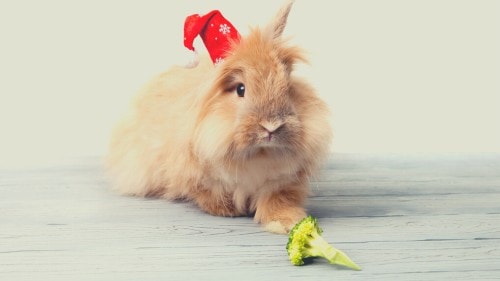
Bunnies often hesitate to try a food they haven’t eaten before. If your rabbit won’t eat broccoli the first time you offer it, leave it in its food bowl for a few hours. In time your rabbit will probably get curious and try it.
Conclusion
Broccoli is great when fed as a treat for bunnies or as a small part of a rabbit’s vegetables for the day. It’s high in vitamins and fiber, and low in oxalic acid, so it’s a safe and healthy treat for rabbits when fed correctly.


